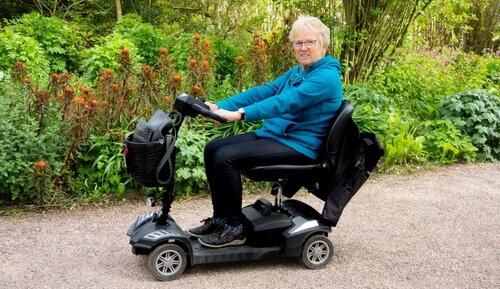This article covers what meals on wheels is, who can get free meals on wheels, how to apply and how to find meals on wheels near you.

Page contents
- What is meals on wheels?
- Does meals on wheels still exist?
- How can I get meals on wheels for free?
- Who qualifies for subsidised meals on wheels UK?
- How much is meals on wheels?
- Benefits of meals on wheels
- What type of dishes are provided?
- Can I request special dietary requirement meals?
- How can I find meals on wheels near me?
- FAQs
Page contents
- What is meals on wheels?
- Does meals on wheels still exist?
- How can I get meals on wheels for free?
- Who qualifies for subsidised meals on wheels UK?
- How much is meals on wheels?
- Benefits of meals on wheels
- What type of dishes are provided?
- Can I request special dietary requirement meals?
- How can I find meals on wheels near me?
- FAQs
What is meals on wheels?
- Meals on wheels has been used in the UK to describe the delivery of meals to the homes of individuals who are unable to prepare their own food themselves. This can be hot meals, frozen or chilled.
- There is no single definition of meals on wheels. Often, the service is called ‘Community meals’, ‘Mobile meals’, or ‘Meal delivery service’.
- These services can be a lifeline for people who have difficulty leaving the house. They depend on it, not just for daily nutrition but for the social interaction and wellbeing safety checks that can result from staff or volunteers visiting your home.
Does meals on wheels still exist?
Yes, in the UK there are local providers of this type of food delivery service for elderly people and those with limited mobility.
In the UK, the name of the meals on wheels type service may differ depending on where you live in the UK, what organisation provides it and the funding available.
How can I get meals on wheels for free?
Some local councils, charities and home care providers are among those who offer meals on wheels services.
- Local churches, community groups and volunteer organisations sometimes provide free, donation‑based meals. Community cafes may run a free meal delivery or community lunch club.
- The NHS may fund free meals on wheels for a limited period after your hospital discharge.
- Food banks can give you free food if you’re in crisis.
- Councils may fund free meals for a limited period after a hospital discharge.
- A minority of local councils still offer meals on wheels in their local area.
- You can search for local meals and wheels services by checking out this Meals on wheels UK map.
- You might be able to get the meals on wheels for free, if you ask your local authority to carry out a care needs assessment. This looks at whether your care needs make you eligible for care. Your council will also carry out a financial assessment to determine if your financial situation makes you eligible for funded care and support, which may include free meals.
- Out of the councils that provide this service, you may need to pay for it, unless you have very limited savings/income. If your local authority doesn’t provide free meals, they should direct you to subsidised providers and charitable organisations.
- Charities such as Age UK operate a UK-wide network of meals and wheels type services. You can search for your local Age UK branch to ask about its meals and wheels service. The service typically includes fresh, nutritious meals delivered daily or weekly and wellness checks by volunteers or staff.
Who qualifies for subsidised meals on wheels UK?
Potentially, this service can help frail, older people, those with disabilities, chronic health conditions, individuals recovering from surgery or illness and those with no access to transportation.
A quarter of UK councils have stopped offering meals on wheels services since 2014, according to research by the National Association of Care Catering (NACC).
This followed cuts to local government adult social care budgets. If a council does offer it, it may not subsidise these meals.
- To determine whether you are eligible for this service from your local authority, you can ask your local council to carry out an adult social care needs assessment for you. If your assessment reveals you cannot manage your nutritional needs or prepare meals, you may be eligible for meals on wheels.
- The council or home care provider may contract out a dedicated meals on wheels provider to deliver dishes. The home care provider may then handle reheating or serving you meal, if the meal has already been delivered.
- Home care providers may provide meal preparation services during home care visits to your home, for example cooking or reheating meals, help with plating up the meal and feeding you.
- If you claim benefits, namely Pension Credit (for people of state pension age), Attendance Allowance, Personal Independence Payment or Universal Credit, while these won’t directly give free meals, claiming these benefits may qualify you for council support.
- Charities may have their own eligibility criteria and you will need to contact them to request help. These organisations may require you to complete an online application form on their website. You may undergo eligibility screening, for example via phone.
How much is meals on wheels?
If you have to pay for this service, you may be wondering how much a hot dish each day will cost you.
The cost of meals on wheels depends on where you live in the UK, who provides it, whether it is subsidised and how many courses or extras you would like.
Example of meals on wheels cost
| Meals on wheels service | Meal | Price |
| Sutton Council | Hot meal and dessert | £6.00 |
| Camms meals on wheels (Cambridgeshire) | Two-course meal Three-course meal | £9.45 £11.45 |
| Age UK Maidstone | Two-course hot meal | £9.80 |
Providers of this food service may accept card payments, bank transfers, cheques but not cash.
Benefits of meals on wheels
The benefits include:
1. Improved health and nutrition
Dishes can meet dietary guidelines and provide vitamins, minerals and calories to help individuals stay healthy.
2. Social connection through human contact
Visits from people delivering the meals can you feel you are not alone.
Loneliness is linked to health risks such as depression, cognitive decline, and heart disease.
3. Increased independence
With regular meals delivered to your doorstep, you can continue living at home, avoiding costly hospital stays or assisted living.
For example, Age UK’s Wiltshire branch provides a ‘Wellbeing Checks with Mealsservice’. It provides hot, freshly prepared meals which are delivered at lunchtimes every day to older people’s homes.
The charity arranges for an external team of chefs, dietitians and nutritionists to make the meals and can cater to specific dietary requirements e.g. low sugar meals.
One woman describing the impact of the service told Age UK:
Thank you again for everything you do, your drivers are amazing, and it is because of you that mum can stay in her own home. So, it is such a gift for us, thank you.”
4. Safety and wellness checks
Those delivering a meal can often spot changes in your condition that could otherwise go unnoticed. This can help to prevent medical emergencies.
One meals on wheels driver admitted:
I never forget a night when it was really bad snow and I delivered to one lady and she was just like… She was nearly in tears, she said, “I really thought I wasn’t going to see anybody today or get any meals. You feel like the fourth emergency service.”
What type of dishes are provided?
Menus on wheels menu for older people tends to offer popular British dishes.
Menus may include main courses such as sausages and mash, fish and chips, roast beef, cottage pie or fish pie.
Desserts may include rice pudding, cheesecake, sticky toffee pudding and chocolate cake.
Can I request special dietary requirement meals?
Yes. Most providers offer meal plans for specific dietary needs.
How can I find meals on wheels near me?
You can search for your local council to find local meals on wheels services.
Local providers include charities like Age UK meals on wheels service, which operates across the UK for older people.
You can search for local meals and wheels services by checking out this Map – Meals on Wheels UK.
If you need more support at home, whether it be help preparing meals, feeding yourself or food shopping, you may want to consider regular visits from a home care service.
If you’re concerned that you or a relative needs assistance with preparing meals, nutritional guidance, has a loss of appetite or needs support with daily tasks, you can search for local home care services near you.
FAQs
What is meals on wheels?
Meals on wheels has been used in the UK to describe the delivery of meals to the homes of individuals who are unable to prepare their own food themselves. This can be hot meals, frozen or chilled.
How can I get meals on wheels for free?
Churches, charities and volunteer organisations sometimes provide free, donation‑based meals and the NHS and your council may fund free meals on wheels for a limited period after your hospital discharge.
You can ask your council to carry out a care needs assessment. It can also conduct a financial assessment to determine if your financial situation makes you eligible for funded support, which may include free meals.
You can also search for local meals and wheels services by checking out the Meals on wheels UK map.
How much is meals on wheels?
The cost of meals on wheels depends on where you live in the UK, who provides it, whether it is subsidised and how many courses or extras you would like. A two-course meal can cost between £6-10 per person.

Find home care near you



